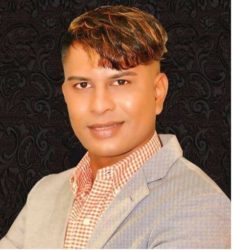September 3,2017 Source
The lawyer for US-based Guyanese murder accused Marcus Brian Bisram has argued that the 1931 treaty between the US and the United Kingdom, which the prosecution has relied on for his extradition to Guyana, had been called into doubt by the Supreme Court here.
Bisram and several others are facing charges over the killing of Number 70 Village carpenter Faiyaz Narinedatt. Bisram was nabbed in the US in July and is now on remand facing extradition.
Responding to the US government’s submission to Magistrate Judge Peggy Kuo’s court, Bisram’s lawyer, Mario F. Gallucci, pointed out that in 1931 Guyana was a territory of the United Kingdom but gained independence in 1966 and although the treaty has been honoured to some degree its “full force and effect” has been called into doubt by Guyana’s Supreme Court.

He pointed out that the issue lies in whether the treaty is contradicted by the Fugitive Offenders Act 1988 which was discussed in the matter of now convicted drug trafficker Barry Dataram. It was argued that while the Guyanese legislature acknowledged the issue by promulgating the Fugitive Offenders Amendment Act of 2009, the act is not binding on the courts of the United States and therefore the issue remains open and it cannot be said that the treaty remains in “full force and effect.”
The case that Gallucci referred to was the Guyana Full Court ruling in 2008 that exposed a lacuna in the local law and had stalled attempts to extradite Dataram. Dataram was wanted by US authorities for drug trafficking but was never extradited. He was jailed in Guyana earlier this year for drug trafficking in a separate case.
The extradition treaty between the UK and the US, containing a proviso that allowed the US to extradite Guyanese nationals to third countries, clashed with the provisions of the Fugitive Offenders Act, which at the time said “no one shall be extradited or kept in custody for the purpose of extradition from Guyana to another country unless provision has been made by that Commonwealth or treaty-country for ensuring that they would not be extradited to a third country for trial of any offence without the consent of the minister.”
In the wake of that case, the then government passed an amendment to the Fugitive Offenders Act, which addressed the conflict.
Well-established
In response to Bisram’s lawyer’s argument, the US prosecution pointed out that the existence of a treaty between the United States and Guyana is well-established and argued that the fact that one Guyanese court recognised a potential conflict between the treaty and internal Guyanese law does not in any way vitiate the treaty as a matter of US or international law. It was also pointed out that after Guyana gained independence the treaty remained in effect. According to the US government, the treaty provides an explicit mechanism for exiting it and this has not been employed and neither country has indicated intentions to do so.
Further, it was noted that Dataram’s case is wholly inapplicable since it involved extradition from Guyana to the US and it was Guyana which determined that the possibility that the fugitive would be extradited from the US to a third country meant that any extradition would be “contrary to the prohibitive provision of section 8(3)(b) of the Fugitive Offenders Act.” It was pointed out that there is no allegation that Guyana’s Fugitive Offenders Act will be violated by extradition in this case from the US to Guyana.
Bisram’s lawyer had also called into question the evidence against him in the local courts but this was described as misplaced by the prosecution in the context of an extradition hearing. It was pointed out that whether he is in fact guilty is a matter for Guyana’s courts to determine when he stands trial in Guyana and also he is not entitled to a mini-trial in the US.
Bisram is behind bars in the US following his arrest on July 4 in New York pursuant to a warrant issued by Magistrate Judge James C Francis IV on June 16. The trial is set to commence on September 11.
Bisram, police have alleged, procured and commanded Orlando Dickie, Radesh Motie, Diodath Datt, Harri Paul Parsram, and Niran Yacoob to murder Narinedatt between October 31 and November 1, 2016, at Number 70 Village, Berbice. A preliminary inquiry into the murder charge against them is ongoing.

